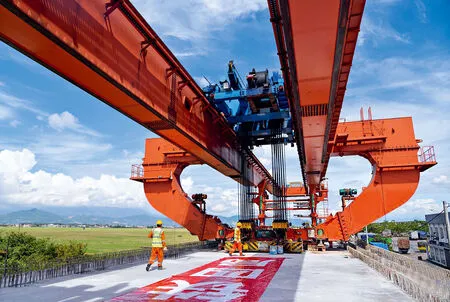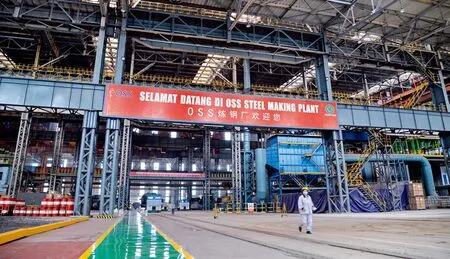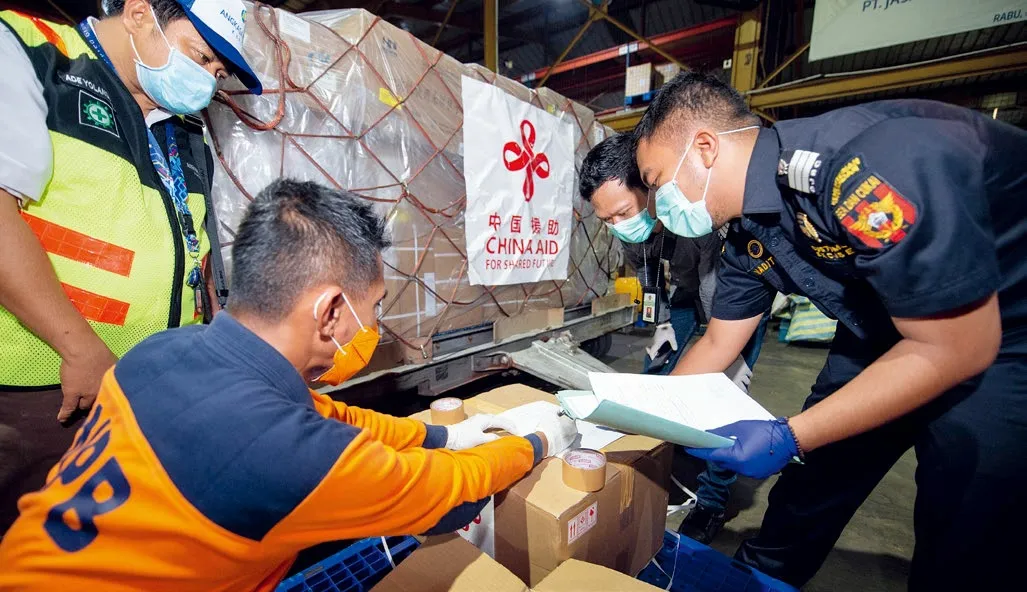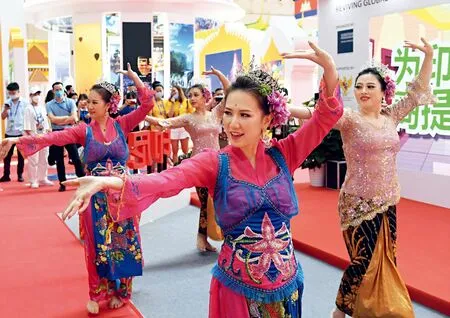GOLDEN OPPORTUNITY FOR CHINA-INDONESIA COOPERATION
By Luo Chuanyu

No.4 girder field of the Jakarta-Bandung High-Speed Railway in Bandung,Indonesia,May 25,2022.(XU QIN)
Indonesian President Joko Widodo accepted an invitation from Chinese President Xi Jinping and visited China from July 25 to 26.Widodo was the first head of state to visit China since the Beijing Winter Olympics in February this year,and China was the first stop of Widodo’s East Asia tour,which evidences how much importance both China and India placed on the visit as well as the bilateral relationship.Indonesian media and academics called the visit a“golden opportunity” for China-Indonesia cooperation.
Joko Widodo became the first head of state to visit China since the Beijing Winter Olympics during the first leg of his tour of East Asia,demonstrating how much China and Indonesia value the bilateral relationship
International and Domestic Pressure
The Widodo government is currently grappling with both international and domestic pressure.
The Russia-Ukraine conflict ratcheted up the wrestling between great powers.As the chair of this year’s G20,Indonesia adopted the position of “not taking sides” in direct conflicts.Widodo stressed that the G20 was established as an economic platform to focus on coordination of macroeconomic policies,and that it is not a political arena for countries to deal with geopolitical issues and conflicts.Unfortunately,the United States and some European countries are diminishing G20’s economic significance to use the occasion to debate political issues.At the G20 Finance Ministers and Central Bank Governors Meeting in Washington D.C.in April,participating finance ministers continued arguments over the Russia-Ukraine conflict,forcing Indonesia,which took over the G20’s rotating presidency this year,to give up the final joint statement.
Disputes became even more tense at the G20 Foreign Ministers’Meeting in July when the foreign ministers of the G7 members united to boycott Russia.To express dissatisfaction with Russia attending the meeting,they all stayed away from the dinner and refused to take the traditional group photo together.Because of the stalemate,many important issues scheduled for discussion,including the global economy and food crisis,were set aside.The meeting ended with no substantial joint declaration either.
In this tense situation,China’s support will be essential for Widodo to hold a successful G20 Leaders’ Summit in November and achieve the goals on the meeting’s agenda.Indonesia needs China to coordinate and mediate disputes among participating countries and prevent any ASEAN country from “taking side” at the summit.Meanwhile,Indonesia is also seeing mounting domestic pressure.Like many other countries,its inflation rate is surging because of the soaring prices of food and energy.
According to statistics from Indonesia’s Central Bureau of Statistics,the annual inflation rate reached a record 4.35 percent this June,the highest since 2019.
Indonesia has been doing better at controlling inflation than many countries like the US and the UK.In 2020,it rolled out a national program to recover the domestic economy which successfully maintained the purchasing power of low-and middle-income families.However,the continuing price increase of life necessities including cooking oil,eggs,beef,sugar,and beans is straining many households in the country with a population of 275 million people.Indonesia has also been struck by the recent outbreak of Foot and Mouth Disease (FMD) as well as frequent floods and an extended dry season that has affected domestic agricultural production and harvests.These disasters added even more pressure to inflation.
Although Widodo’s government stepped up fiscal allocation to provide greater subsidiaries to affected industries and people,the constantly changing prices of raw materials undermined the government’s efforts.However,Indonesia did see a spike in income recently because the prices of its major exports such as coal,nickel,and palm oil increased,but the country is facing the dilemma of flagging supply capacity and purchasing power,both of which would threaten Indonesia’s national and social security in the long term.
Therefore,it is essential for Widodo,a pragmatic state leader focusing on economic development,to prioritize economic and trade cooperation with China,its biggest trading partner,at the top of his diplomatic strategies.Before Widodo’s visit,Indonesian Foreign Minister Retno L.P.Marsudi made it clear that the focus of talks between the heads of the two countries would be “enhancing economic cooperation,particularly on trade and investment.”
其中,Xno r m为归一化后数据,X为原始数据,Xm ax、Xm i n分别为原始数据的最大值及最小值。
Fruitful Meeting
China was enthusiastic about Widodo’s visit,and both sides held multiple high-level talks and released a joint statement on enhancing cooperation.
First,China and Indonesia will strengthen cooperation under bilateral and multilateral frameworks.
To boost bilateral cooperation,both sides further interpreted the China-Indonesia Comprehensive Strategic Partnership,highlighting duties related to securing the interests of emerging market economies and developing countries.The two sides agreed to strive to build a China-Indonesia community with a shared future,forging an exemplary model of South-South cooperation for mutual benefits,win-win results,and common development.
On multilateral collaboration,both sides stressed each other’s significance in regional and international affairs.China reaffirmed its support for ASEAN centrality in the regional architecture to facilitate regional economic recovery.China and Indonesia support each other in various fields to produce mutual benefits,practice multilateralism,and contribute to boosting world economic rejuvenation and development and improving global economic governance.
China and Indonesia agreed to expand economic and trade cooperation.Both sides signed a cooperation document on exporting Indonesian pineapples to China.China expressed intentions to import more palm oil and other high-quality Indonesian produce to scale up bilateral trade and balance trade while promoting high-quality development.The two countries also upgraded existing cooperation projects and achievements.
It should also be noted that both sides are seeking to materialize benchmark projects to implement the Global Development Initiative(GDI) and focus on issues concerning developing countries.Cooperation would cover poverty alleviation,green development,the digital economy,and areas related to living standards.China and Indonesia are assuming big responsibilities as leading developing countries.

The Obsidian Stainless Steel (OSS)plant in Delong Industrial Park in Southeast Sulawesi,Indonesia.A key Belt and Road project between China and Indonesia,Delong Industrial Park was built by Chinese metals producer Jiangsu Delong Nickel Industry.(XU QIN)

Staff from the Indonesian customs office and the Indonesian National Board for Disaster Management check the first shipment of anti-COVID supplies from China at Soekarno Hatta International Airport in Jakarta,Indonesia,on March 26,2020.(DU YU)

Dancers perform at the Indonesia Pavilion of the 18th China-ASEAN Expo on September 11,2021.(LU BOAN)
Both sides elaborated on cooperation on people-topeople exchanges.Based on the solid foundation and successful experience of jointly fighting COVID-19,the two countries will continue cooperation throughout the vaccine industrial chain and on drug research and development.China pledged to help Indonesia build a regional vaccine production center.
Both countries agreed to accelerate resumption of peopleto-people exchanges.Young people are important participants of people-to-people diplomacy and play a positive role in facilitating national development and international cooperation.Local governments,as the executors of relevant policies,can play a supplementary role in facilitating cooperation between central governments.
China and Indonesia also agreed to expand maritime cooperation.Collaboration on maritime affairs is not only key to synergy between China’s Belt and Road Initiative and Indonesia’s Global Maritime Fulcrum,but also a new highlight of the bilateral relationship shifting to four-pillar cooperation covering politics,economics,people-to-people exchange,and maritime projects.
The joint statement evidenced the two countries’ focus on pragmatic cooperation to further implement the strategies and consensus of the two presidents.The channels for strategic synergy will certainly include maritime departments.On July 22,He Lifeng,chairman of the National Development and Reform Commission of China(NDRC),held a video meeting with Luhut Pandjaitan,Coordinating Minister for Maritime Affairs and Investment and official in charge of Indonesia-China cooperation,to promote synergy between the Belt and Road Initiative and the Global Maritime Fulcrum.Cooperation has targeted Indonesia’s specific needs such as fishery cooperation represented by the National Fish Barn project.
While the world is still suffering from the COVID-19 pandemic and the crisis in global supply chains,Widodo’s visit to China will give Indonesia a sharper edge to complete recovery of its national economy.
Golden Opportunity for Global Governance
Widodo’s visit also brought golden opportunities to China.During his stay,China reached consensus with Indonesia on development issues and pledged to work with Indonesia on concrete measures to implement the GDI by aligning China’s relevant initiatives with the ASEAN Outlook on the Indo-Pacific while expanding regional cooperation.
China’s invitation also showed the world how it welcomes foreign friends and that the country has opened the door to visiting heads of state.Rather than being intimidated by the COVID-19 pandemic,China has kept a close eye on global and regional development as it has assumed responsibility as a major country committed to promoting global governance.
Widodo’s visit also brings golden opportunities to East Asia and the Pacific Region as well.This year,Cambodia is the rotating chair of ASEAN and related Summits,Thailand will host the APEC Economic Leaders’ Meeting,Indonesia will host the G20 Leaders’ Summit,and China will host the BRICS Leaders Meeting.
Asia’s time has come in global governance.In May,Cambodia,Indonesia,and Thailand issued a joint press release to call for Asian solidarity in response to various challenges.The three countries declared that Asian countries should play a positive role in maintaining regional and global peace and stability in the face of a turbulent international landscape.The meeting between Chinese President Xi Jinping and Indonesian President Joko Widodo laid a solid foundation for strengthening multilateralism and provided strong support for ASEAN centrality in regional architecture,ongoing implementation of the Belt and Road Initiative,and wider development of the ASEAN Outlook on the Indo-Pacific.

